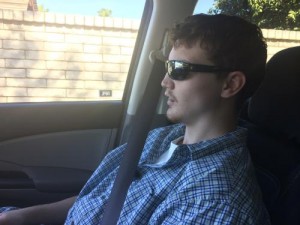By Lisa Ansay —
After that belly surgery and ICU-stay in June, Taylor has been back at the house doing full-time rehab.
He thought sharing parts of this article would be a great way to explain what’s going on in his days right now; how it feel inside his head.
The most relevant points for his TBI recovery he included below. For the entire article please visit the brainline.org website, or see the reference at the bottom of this entry.
Lost & Found: What Brain Injury Survivors Want You to Know
I need a lot more rest than I used to. I’m not being lazy. I get physical fatigue as well as a “brain fatigue.” It is very difficult and tiring for my brain to think, process, and organize. Fatigue makes it even harder to think.
My stamina fluctuates, even though I may look good or “all better” on the outside. Cognition is a fragile function for a brain injury survivor. Some days are better than others. Pushing too hard usually leads to setbacks, sometimes to illness.
Brain injury rehabilitation takes a very long time; it is usually measured in years. It continues long after formal rehabilitation has ended. Please resist expecting me to be who I was, even though I look better.
I am not being difficult if I resist social situations. Crowds, confusion, and loud sounds quickly overload my brain, it doesn’t filter sounds as well as it used to. Limiting my exposure is a coping strategy, not a behavioral problem.
If there is more than one person talking, I may seem uninterested in the conversation. That is because I have trouble following all the different “lines” of discussion. It is exhausting to keep trying to piece it all together. I’m not dumb or rude; my brain is getting overloaded!
Patience is the best gift you can give me. It allows me to work deliberately and at my own pace, allowing me to rebuild pathways in my brain. Rushing and multi-tasking inhibit cognition.
Please have patience with my memory. Know that not remembering does not mean that I don’t care.
If I seem “rigid,” needing to do tasks the same way all the time; it is because I am retraining my brain. It’s like learning main roads before you can learn the shortcuts. Repeating tasks in the same sequence is a rehabilitation strategy.
If I seem “stuck,” my brain may be stuck in the processing of information. Coaching me, suggesting other options or asking what you can do to help may help me figure it out. Taking over and doing it for me will not be constructive. (It may also be an indication that I need to take a break.)
We need cheerleaders now. Please help me and encourage all efforts. Please don’t be negative or critical. I am doing the best I can.
Don’t confuse Hope for Denial. We are learning more and more about the amazing brain and there are remarkable stories about healing in the news every day. No one can know for certain what our potential is. We need Hope to be able to employ the many, many coping mechanisms, accommodations and strategies needed to navigate our new lives. Everything single thing in ourlives is extraordinarily difficult for us now. It would be easy to give up without Hope [and Faith].
Created with the assistance of the “Amazing”Brain Injury Survivor Support Group of Framingham, MA.
Excerpted from Lost & Found: A Survivor’s Guide for Reconstructing Life After a Brain Injury by Barbara J. Webster. © 20ll by Lash & Associates Publishing/Training Inc.




